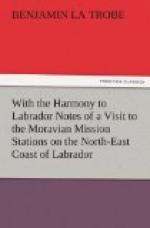When I went on deck this morning the island of Ukalek, or “The Hare,” was astern, various rocky islets, imperfectly marked, or altogether omitted on the chart, were on both sides of us, and Zoar far ahead among the distant hills. Our vessel was almost imperceptibly gliding in that direction. May the Lord, who alone knows the rifts and rocks of this marvellous coast, bring us safely thither, and guide me aright amid the difficulties of the present situation there! These people have learned no wisdom or thrift, in spite of all the love and patience shown them, and they have made the past winter a most trying time for their devoted missionaries.
The mirage yesterday and to-day is a wonderful freak of nature. At times, nothing can be seen as it really is. Icebergs and islands are flattened to one dead level, or doubled, so as to appear now like long bridges, now like high towers. The rapid changes in the appearance of solid masses are marvellous. All day we have been slowly sailing westward, new prospects of distant hills ever opening up as we passed headland after headland. Presently the barren rocks began to be clothed with firs here and there, but the lifelessness of the scene was striking. Once we caught sight of two or three Eskimo tents on a little island, but no human beings were visible. Only a solitary grampus made the circuit of our ship.
At length we round the last cape, and enter Zoar Bay. Presently we come in sight of the station buildings between the fir-clad slope and the shore. There is the store, now the mission-house and church appear from behind yonder rock. The Eskimoes are firing their shots of welcome, answered by rockets from the ship. Thank God, the station flag is flying at the mast-head! That tells us that neither illness nor accident have been permitted to carry off any of the missionaries.
Look behind you. The hills are glowing with a
glorious
“Alpengluehen”—an evening effect
as splendid as it is surprising.
Now we are nearer. They are launching the “Emily,” the station boat. Rowed by natives, she comes alongside almost as soon as our anchor is down, and all the resident missionaries climb on board, followed by a number of Eskimoes.
Soon our hosts carry us off to the hospitable little mission-house, which somehow or another manages to find comfortable quarters for all the visitors. I am writing up my diary in Mr. and Mrs. Rinderknecht’s pleasant rooms, which I am to share with Mr. Kaestner, who is on his way to Nain to take part in our conference there. Mr. and Mrs. Martin are occupying the spare room below us, and the Lundbergs have also turned out to make room for Mr. and Mrs. Dam. Where our hosts have taken up their abode meanwhile remains a riddle for the present. (The riddle was solved in a subsequent tour of inspection of the house, when I found that the one resident couple had retired to the garret and the other to a workshop on the ground floor.)




